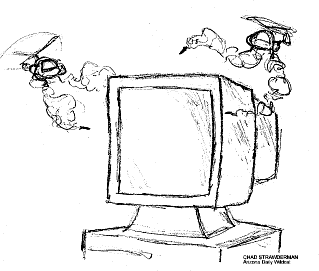![]()
![[ OPINIONS ]](/images/fall97/opinionsf97.gif)
By Eric E. Clingan
Arizona Daily Wildcat March 25, 1998
Cyberspace and the Bill of Rights
![[Picture]](04_2_i.gif)
Eric E. Clingan |
Welcome back. Spring break, no doubt, has spawned more than a few stories
complete with details of drunken romps, sex on the beach and perhaps even
a stay or two in jail, providing the realization that American freedoms
end at the Mexican border.
While we were away, though, a 16-year-old high school student in Cleveland, Ohio, was given an unexpected spring break. He was flung into uncharted waters protecting our First Amendment rights.
Sean O'Brien is a crafty high school student who designed his own website. According to reports in USA Today, "O'Brien's website featured a photograph of his high school band teacher and described him as, 'an overweight, middle-aged man who doesn't like to get haircuts.' The student also wrote, 'He likes to involve himself in everything you do, demands that band be your number one priority, and favors people.'" His website so threatened school officials that, for his outspoken use of the Internet, O'Brien was struck with a 10-day suspension from school.
O'Brien began his plunge deeper into the origins of this country and the extent of its freedoms the only way Americans sometimes can: He sued. Citing his First Amendment rights to freedom of speech, O'Brien is asking for $550,000 from school administrators and the district. More importantly, the student has broken new ground in the extension of constitutional protections into cyberspace. A Senior U.S. District Judge has already ordered the school to drop its suspension, reinstate the boy and submit to a full hearing on the matter on April 3.
Truly, this is a unique case that, one day, may have an impact of immeasurable proportions. While O'Brien bases his case on the First Amendment, he may also have equal protection under the Fourth Amendment which guarantees, "The right of the people to be secure in their persons, houses, papers, and effects against unreasonable searches and seizures."
Does a web page constitute a person's "personal effects"? Are a web page and its owner's personal computer an extension of one's "house"? Unfortunately, as the Arizona Republic reports, the Supreme Court has provided "no clear ruling . . . on the level of access government investigators ought to have to information transmitted on the Internet." They will have to soon.
Meanwhile, a fault line resting between cyberspace and reality is shaking the political alliances of this country. The American Civil Liberties Union has found an unlikely friend in capitalist conservatives who see the Internet as the final testing ground of Adam Smith's economic theory. Both groups are pressing the government for a hands-off approach toward cyberspace out of deeper concerns for freedom and privacy. On the opposite side, feminists and religious conservatives are demanding the government enact yet another communications decency law, which would prohibit the transmission of pornography and other threatening materials over the Internet.

Currently, Arizona, New Mexico and Illinois are among the many states considering bills which would criminalize the transmission of "indecent material" to minors via the Internet. Largely prompted by religious zealots on the extreme right, some politicians profess to be concerned over the "danger" and "irreparable harm" which could overcome a child armed only with a mouse, a keyboard and simple curiosity. However, many of these same politicians see no equivalent "danger" in the loaded shotgun which may hang directly over the "dangerous" computer in any American living room due to our ambiguous Second Amendment. Which threatens you the most, the click of a trigger or the click of a mouse?
In the end, the Internet promises to be the last great battleground over both the merits of capitalism and the responsibility that must accompany American freedoms. Without question, pornographic and hate-mongering websites are despicable. Still, these sites only exist because someone is deriving economic benefit from them.
So, instead, consider the efforts of one group of Christian activists, the Southern Baptists, who have responded to television's "Ellen," by boycotting ABC and Disney, the show's producers. The show is not expected to survive after this season. Since every website has an Internet service provider that is equally as answerable and responsive to such actions as a television network, such boycotts could be conducted at this level and with greater success. Customer service and public relations, two cornerstones of the theory of capitalism, do indeed exist in cyberspace. Young, upstart companies may be even more respectful of their public's wishes than behemoths like Disney. America Online and GeoCities are just two such providers whose self-regulation has increased their membership and profits while all but eliminating smut and sleaze from their hosted sites.
By ignoring the power each of us has as Internet customers in this capitalistic society, we threaten ourselves with the uncoerced surrender of the freedoms our forefathers fought to gain. If we continue to look to the faceless Big Brother that is unrestrained government of these matters, more harmless 16-year-olds will undoubtedly be suspended for simply drawing attention to their teachers' haircuts or lesser offenses.
Eric E. Clingan is a senior majoring in political science. His column, "The Provacatuer" appears every Wednesday.



